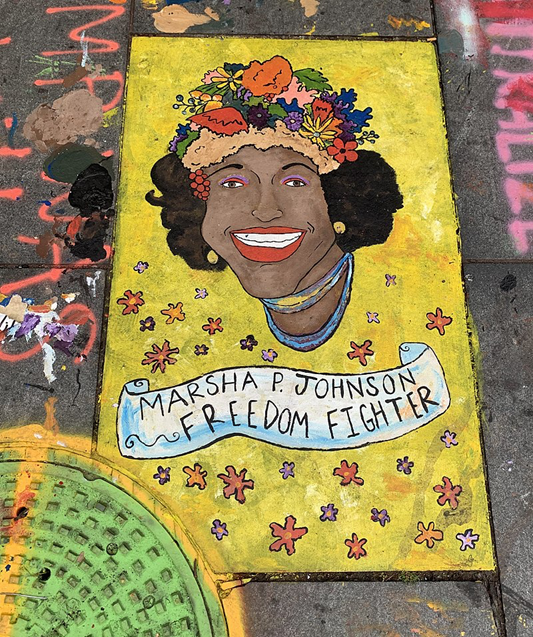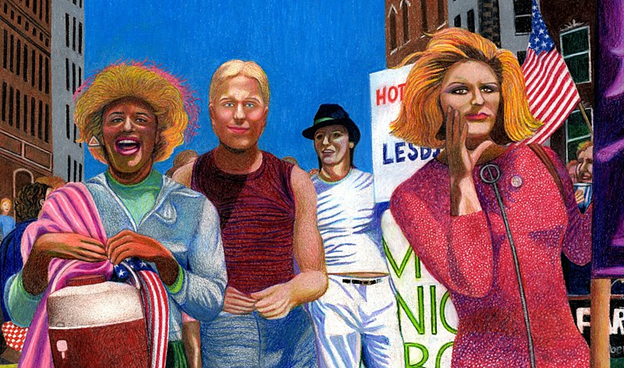Transgender Day of Visibility and the Trailblazer Marsha P. Johnson
Transgender Day of Visibility is celebrated each year on March 31.
This tradition began in 2009 to raise awareness of the discrimination and intimidation faced by members of the transgender community as well as celebrate the resiliency and accomplishments of this group. The transgender community has long struggled for recognition, and the history of their work to gain acceptance and avoid persecution is one that is not frequently told. As we reflect on this day, the members of the ASRA Pain Medicine LGBTQIA+ SIG would like to highlight one of the pioneers of the movement to gain acceptance and equal rights for the LGBT community. In addition, we challenge you to consider your role in this struggle for equality and how your actions and words might impact the life of another. Embrace opportunities to learn and engage. Become comfortable with routine recognition and utilization of preferred pronouns to demonstrate your support for a transgender patient or colleague. Thank you!

Written by Ashley Rogers, MD
With contributions by SIG leadership team:
Olga (Kiki) Nin, MD
Po-Yi Paul Su, MD
Adam Fischler, MD
Kristopher Schroeder, MD
Elliott Higgins, MD
Marsha P. Johnson was a trailblazing pioneer in the transgender acceptance movement who was born on August 24, 1945, in Elizabeth, NJ. A young victim of sexual assault, Marsha hid their identity and sexual orientation for the entirety of their young life.
After graduating high school in 1963, Marsha moved to New York City with no money or possessions. It was here that Marsha embraced the gay liberation movement. They chose the name Johnson after Howard Johnson’s restaurant on 42nd street. The “P” stands for “Pay it no mind,” which was Marsha’s response when questioned about their gender. At different times Marsha identified as gay, transvestite, and “queen” (a.k.a. drag queen or “street
queen”). In 1972, Marsha identified as a “Street Transvestite Action Revolutionary.” Perhaps best described as gender non-conforming, Marsha never identified as transgender. They distinguished between the terms
transvestite (“like a boy, very manly looking, a feminine boy”) and
transsexual (on hormone replacement, pursuing gender-conforming surgery). However, the dialogue about gender has evolved a lot since Marsha’s life, so the meaning of these words could have been different for Marsha than our modern
interpretation of them.
Marsha’s style of dress was ostentatious and purposefully showcased both masculine and feminine characteristics. They often wore a crown of fresh flowers. However, finances were a huge limitation to Marsha’s preferred style of dress. Marsha
most commonly performed for grassroots audiences with acts that were both humorous and political. They were a member of both Hot Peaches and Angels of Light, traveling drag performance troupes, for many decades. Marsha was photographed
by Andy Warhol for his polaroid series Ladies and Gentlemen in 1975. In addition to gay activism, Marsha was an HIV/AIDS activist in part due to their HIV positive status.
Interpersonally, Marsha is described as generous, warm-hearted, and even “saintly.” Some have gone as far as to state “Marsha P. Johnson was the Rosa Parks of the LGBT movement.” Marsha kept in close communication with their family
in New Jersey and would return home for holidays, often with friends whom they met during their journey who were in need of a hot, home-cooked meal.
Marsha was one of the first gender-nonconforming individuals to patronize the Stonewall Inn when drag queens and women were permitted (previously only male-presenting gay men were allowed). The Stonewall Uprising began around 1:20 AM on June 28, 1969, when Stormé DeLarverie resisted arrest. This event, which lasted for about 2 days and inspired protests across New York City for the next week, sparked the modern gay rights movement. The events of this night have been described by varying conflicting accounts. At the time, publicly known participation could result in serious legal ramifications. Marsha P. Johnson, along with Zazu Nova and Jackie Hormona, were identified among those present at the initial Stonewall raid and who pushed back against police on that momentous night. Marsha themselves denied starting the uprising, stating that they arrived around 2 am with things already well under way, and the Inn already ablaze after the police set fire to it. Soon after arrival, Marsha was reported by some accounts to throw a shot glass at a mirror, shouting “I got my civil rights!” One witness described this moment as “The shot glass that was heard around the world.”

Marsha P. Johnson, Joseph Ratanski, and Sylvia Rivera in the 1973 New York City Gay Pride Parade.
Artwork by Gary LeGault. From Wikimedia Commons.
One year later, Marsha marched in the first Gay Pride parade. Marsha became an active member of the Gay Liberation Front and the GLF drag queen caucus. They staged a sit-in at New York University in August of 1970 when a dance was cancelled because it
was sponsored by gay organizations. In 1973, Marsha was banned from participating in the Gay Pride March because of objections to drag queen participation. Marsha and their drag queen advocate friends defied this by marching ahead of the parade instead.
Marsha co-founded the Street Transvestite Action Revolutionaries (STAR) organization, which advocated for gay rights along with other civil rights issues, as well as STAR House, a shelter for homeless queer youth. The shelter was kept open by money
they made doing sex work.
For many years, Marsha was homeless and resorted to survival prostitution for their livelihood. Around 1980, friend Randy Wicker invited Marsha to spend the night one cold winter evening, and they stayed with him until their death in 1992. Later in life,
Marsha devoted much of their time to those sick and dying of AIDS. They also participated in street activism with the ACT UP (AIDS Coalition To Unleash Power) campaign. In the 1980s and 90s, homophobic violence was at its peak in New York City, with
nearly 20% of these instances perpetrated by police. Marsha was a vocal participant in protests to raise awareness for this issue. On July 6, 1992, Marsha’s body was found in the Hudson River. Initially ruled a suicide, Marsha’s closest
friends do not believe this to be the case. There are various accounts which suggest Marsha was murdered.
Marsha P. Johnson devoted their life to the cause of equality, civil liberty, and gay rights during a time when these beliefs were incredibly dangerous and unpopular. They spent their life in poverty to lift up their community and deliver the next generation
to a better future. Marsha’s dedication and bravery continue to inspire civil liberty discourse and progress decades later. Today the issues that transgender individuals face are more nuanced, but are still fueled by the same discrimination.